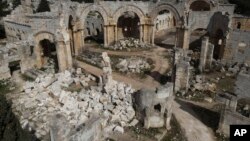Six months after massive earthquakes struck Turkey and Syria, people are still reeling from enormous challenges, such as finding decent housing, sanitation, and access to clean water. Aid groups have expressed concern, particularly for people in northwest Syria who are isolated from international assistance and face challenges over cross-border supply access.
Coupled with 12 years of civil war, the earthquakes exacerbated an already dire situation in Syria’s northwest, a predominately rebel-held area of 4.3 million people.
David Miliband, who heads the New York-based International Rescue Committee, said the area has a number of challenges.
"The earthquake interfered with the electricity supplies; it destroyed water and sanitation infrastructure, and so life is really, really, really tough for everyone in northwest Syria, including our civilian aid workers," he said. "It’s a very, very challenging operating environment because the material situation is grave. Lots of people in tents, lots of people fearful of being in buildings in case further tremors destroy more buildings."
Thomas Weiss of Malteser International, the relief organization of the Catholic Order of Malta, visits northwestern Syria regularly as head of the group’s Middle East department.
Working with local partners, the organization provides medical services through hospitals and a maternity clinic, as well as mobile medical units sent to the earthquake-affected areas. It also supplies clean water and sanitation services in some of the camps for the internally displaced.
Weiss said international aid groups are concerned about the ability to bring in humanitarian assistance safely.
"Humanitarian access to Syria must be safe, consistent and especially protected from politicization," he said. "The cross-border mechanism has been an essential component of this protection. We have a protracted situation that has gone on for many years now in the northwest. There is a risk to abandon northwest Syria and the many millions of people in urgent need of humanitarian support and is of extreme great concern."
For the last nine years, a border crossing between Turkey and northwest Syria, Bab al-Hawa, has been authorized under a U.N. Security Council resolution to bring in aid, eliminating the need for Syrian government permission. Russia, a member of the Security Council, last month vetoed an attempt to renew the deal authorizing use of the crossing.
This past week, the U.N. said it had reached a deal with the government of Syrian President Bashar al-Assad to reopen Bab al-Hawa.
While the Assad government has offered to allow the U.N. to use Bab al-Hawa, humanitarian groups find the conditions required violate their principles of neutrality and impartiality.
The International Rescue Committee reports that Al-Ra’i and Bab Al-Salam, two other crossing points that were opened after the earthquake, are now authorized to remain open until November. Those crossing points are also on the border with Turkey.




